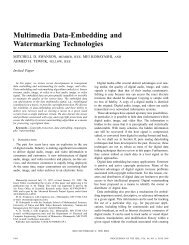Electrodes for Medical Purposes
Electrodes for Medical Purposes
Electrodes for Medical Purposes
Create successful ePaper yourself
Turn your PDF publications into a flip-book with our unique Google optimized e-Paper software.
<strong>Electrodes</strong> <strong>for</strong> <strong>Medical</strong><br />
<strong>Purposes</strong>
<strong>Electrodes</strong>-Electrolyte Interface<br />
• Electrode: A solid electric conductor through which an<br />
electric current enters or leaves an electrolytic cell or<br />
other medium (Faraday, Michael (1834). “On Electrical<br />
Decomposition”)<br />
Electrode-electrolyte interface [2]
<strong>Electrodes</strong>-Electrolyte Interface<br />
General Ionic Equations<br />
a) C C n+ + ne -<br />
b) A m- A + me -<br />
The basic electrolytic experiment,<br />
shown with material transport<br />
directions. [5]<br />
The dominating reaction can be<br />
inferred from the following :<br />
- Current flow from electrode to<br />
electrolyte : Oxidation (Loss of e-)<br />
- Current flow from electrolyte to<br />
electrode : Reduction (Gain of e-)
<strong>Electrodes</strong>-Electrolyte Interface<br />
Metal cat-ion leaving into the electrolyte<br />
No current flow<br />
One atom M out of the metal<br />
is oxidized to <strong>for</strong>m<br />
one cation M + and giving off<br />
one free electron e -<br />
to the metal.
<strong>Electrodes</strong>-Electrolyte Interface<br />
Metal cat-ion joining the metal<br />
No current flow<br />
One cation M + out of the<br />
electrolyte becomes one<br />
neutral atom M taking off<br />
one free electron from the metal.<br />
5
Half Cell Potential<br />
metal: Li Al Fe Pb H Ag/AgCl Cu Ag Pt Au<br />
V h / Volt -3,0 negativ 0 0,223 positiv 1,68<br />
6
Nernst Equation<br />
For arbitrary concentration and temperature<br />
E = E h +(RT/nF)·ln(a red /a ox )<br />
E – redox equilibrium electrode potential with no current<br />
flow<br />
E h – Half-cell potential<br />
R = 8.314 J /(mol*K) – molar gas constant<br />
T – absolute temperature<br />
n – valence electrons<br />
F = 96485 C/mol – Faraday’s constant<br />
a red – Reduction activity<br />
a ox – Oxidation activity
Measuring Half Cell Potential
Electrode double layer<br />
No current flow
Polarization<br />
• with current flowing the half-cell voltage changes this voltage<br />
change is called overpotential or polarization.<br />
.<br />
V p = V r + V c + V a<br />
activation, depends on direction of reaction<br />
concentration (change in double layer)<br />
ohmic (voltage drop)
Polarizable and Non-Polarizable<br />
<strong>Electrodes</strong><br />
• Perfectly Polarizable <strong>Electrodes</strong><br />
The current across the interface is a displacement current and the electrode<br />
behaves like a capacitor. No electrodes’ ions transfer. Instead, the ions and<br />
electrons (of the solution) at the surface of the metal become polarized. The<br />
charges orient at the interface to create an electric double layer; the metal then<br />
acts like a capacitor.<br />
Example : Silver/silver chloride (Ag/AgCl) electrode, Platinum (Pt) electrode,<br />
metal electrodes. [5]<br />
• Perfectly Non-Polarizable Electrode<br />
Current passes freely across the electrode-electrolyte interface, requiring no<br />
energy to make the transition. No overpotentials. Non-polarizable electrodes<br />
are reversible (ions in the solution are charged and discharged).<br />
Example: Silver/silver chloride (Ag/AgCl) electrode. Mercury/mercurous<br />
chloride (Hg/Hg 2 Cl 2 ) (Calomel).
Ag/AgCl Electrode<br />
• Fabrication of Ag/AgCl electrodes<br />
1.Electrolytic deposition of AgCl<br />
2.Sintering process <strong>for</strong>ming pellet electrodes
Equivalent Circuit<br />
C d<br />
R d<br />
R el<br />
V h<br />
Frequency Response
Examples of Applications<br />
[6]
Electrode Skin Interface<br />
• Alternation of<br />
skin transport (to<br />
deliver drugs<br />
through Pores )<br />
can be done by<br />
laser, ultrasound<br />
or by<br />
iontophoresis<br />
• Skin impedance<br />
<strong>for</strong> 1cm 2 patch:<br />
200kΩ @1Hz<br />
200 Ω @ 1MHz
Surface <strong>Electrodes</strong><br />
• Metal plate electrodes<br />
(a) Metal-plate electrode used <strong>for</strong><br />
application to limbs. Still use in ECG.<br />
(b) Metal-disk electrode applied with<br />
surgical tape. Metal disk with stainless<br />
steel; platinum or gold coated EMG,<br />
EEG<br />
(c)Disposable foam-pad electrodes,<br />
often used with ECG
Surface <strong>Electrodes</strong><br />
• Floating electrodes<br />
-metal disk in the<br />
electrolyte gel<br />
-not in contact with the<br />
skin<br />
-reduces motion artifact<br />
• Suction electrodes<br />
-No straps or adhesives<br />
required<br />
-precordial (chest) ECG<br />
-can only be used <strong>for</strong><br />
short periods
Surface <strong>Electrodes</strong><br />
• Flexible electrodes<br />
-Body contours are often irregular<br />
-Regularly shaped rigid electrodes<br />
may not always work.<br />
-Special case : infants<br />
-Material : Polymer or nylon with<br />
silver, Carbon filled silicon<br />
rubber (Mylar film)<br />
(a)<br />
(b)<br />
(c)<br />
Carbon-filled silicone rubber<br />
electrode.<br />
Flexible thin-film neonatal<br />
electrode.<br />
Cross-sectional view of the<br />
thin-film electrode in (b).
Surface <strong>Electrodes</strong> (EMG)<br />
• Clips electrodes<br />
• Ring electrodes<br />
• Bipolar Felt Pad<br />
Stimulator/Electrode<br />
• Bar electrodes
Internal <strong>Electrodes</strong><br />
• Needle and wire electrodes<br />
<strong>for</strong> percutaneous measurement of<br />
biopotentials<br />
(a)<br />
(b)<br />
(c)<br />
(d)<br />
(e)<br />
Insulated needle electrode.<br />
Coaxial needle electrode.<br />
Bipolar coaxial electrode.<br />
Fine-wire electrode<br />
connected to hypodermic<br />
needle, be<strong>for</strong>e being inserted.<br />
Cross-sectional view of skin<br />
and muscle, showing coiled<br />
fine-wire electrode in place.
Internal <strong>Electrodes</strong><br />
• Electrocorticographic electrodes<br />
micro-electrocorticography<br />
(micro-ECoG) grid (Spencer Kellis)<br />
Human ECoG Grids <strong>for</strong> Epilepsy. Courtesy of Daniel Moran, biomedical engineering,<br />
School of Engineering & Applied Science, Washington Univ., St. Louis
Electrode Arrays<br />
(a) One-dimensional plunge electrode<br />
array.<br />
(b) Two-dimensional array
Electrode Arrays<br />
(c) Three-dimensional array<br />
Utah Microelectrode array. Courtesy of University of Utah and Cyberkinetics Inc.
Microelectrode<br />
• Measure potential difference across cell membrane<br />
eg. Intracellular electrode, Extracellular electrode.<br />
Tip diameter: 0.05 – 10 microns<br />
• Types<br />
– Solid metal<br />
– Supported metal (metal contained within/outside glass<br />
needle)<br />
– Glass micropipette (Ag-AgCl in potassium chloride<br />
chloride (KCl) solution)
Electrical Properties<br />
of Microelectrodes<br />
• Features<br />
Cannot be modeled as a series resistance and<br />
capacitance(there is no single useful model)<br />
– The body/electrode has a highly nonlinear response to<br />
stimulation<br />
– Large currents can cause Cavitation, Cell damage or<br />
Heating<br />
• Types of stimulating electrodes<br />
1.Pacing 2.Ablation 3.Defibrillation<br />
Platinum electrodes: neural recording and stimulation<br />
Steel electrodes: pacemakers and defibrillators
Metal Microelectrodes<br />
• Extracellular recording – typically in brain where you are<br />
interested in recording the firing of neurons(spikes).Use<br />
metal electrode+insulation -> goes to high impedance<br />
amplifier…negative capacitance amplifier
Metal Supported Microelectrodes<br />
(a)<br />
Metal inside glass (b) Glass inside metal<br />
Intracellular recording – typically <strong>for</strong> recording from cells, such as cardiac<br />
myocyte Need high impedance amplifier…negative capacitance amplifier!
Glass Micropipette filled with an<br />
electrolytic solution<br />
(a) Section of fine-bore glass<br />
capillary.<br />
(b) Capillary narrowed through<br />
heating and stretching.<br />
(c) Final structure of glass-pipet<br />
microelectrode.
Microelectrodes<br />
• Intracerebral Electrode • <strong>Electrodes</strong> <strong>for</strong> movement<br />
disorder surgery
Microelectrodes<br />
• Epidural electrode • Foramen Ovale <strong>Electrodes</strong><br />
http://www.diximedical.net
References<br />
1. Fundamental of Anatomy and Physiology, Frederic H.<br />
Martini<br />
2. Biomedical Instrumentation: Application and Design, John G.<br />
Webster<br />
3. Introduction to <strong>Medical</strong> Electronics Applications, D. Jennings<br />
4. <strong>Medical</strong> Device Technologies: A Systems Based Overview<br />
Using Engineering Standards, Gail D. Baura<br />
5. Bioimpedance and Bioelectricity Basics, Orjan G. Martinsen<br />
6. The Biomedical Engineering Handbook, Joseph D. Bronzino<br />
7. http://www.diximedical.net
• Cu(s) + Zn+2↔Cu+2+ Zn(s)<br />
• Cu(s) ↔Cu+2+ 2e-(oxidation)<br />
• Zn+2+ 2e-↔Zn(s) (reduction)<br />
• There are two types of electrochemical cells:<br />
galvanic(ones that spontaneously produce<br />
electrical energy) and electrolytic(ones that<br />
consume electrical energy).<br />
• E = Eo´+(2.303 /RTnF)log([Ox]/[Red])<br />
• NernstEquation<br />
• ax = γ[x]
Problems<br />
• Describe one “innovative” scheme <strong>for</strong> recording breathing or<br />
respiration. The applications might be respirometry/spirometry,<br />
athelets knowing what their heart rate is, paralyzed individuals who<br />
have difficulty breathing needing a respiratory sensor to stimulate<br />
and control phrenic nerve. You may select one of these or other<br />
applications, and then identify a suitable sensor. The design<br />
(develop suitable circuit) <strong>for</strong> interfacing to the sensor to get<br />
respiratory signal.<br />
• We would like to have a quadriplegic automatic control over the<br />
lighting in the room. Design a basic circuit to detect room light level<br />
and turn on a lamp when the light level falls below a set limit. You<br />
may consider a suitable sensor <strong>for</strong> light and you should consider a<br />
design that compares the sensor output to some predetermined<br />
threshold and produces a high voltage or delivers power to the lamp.















